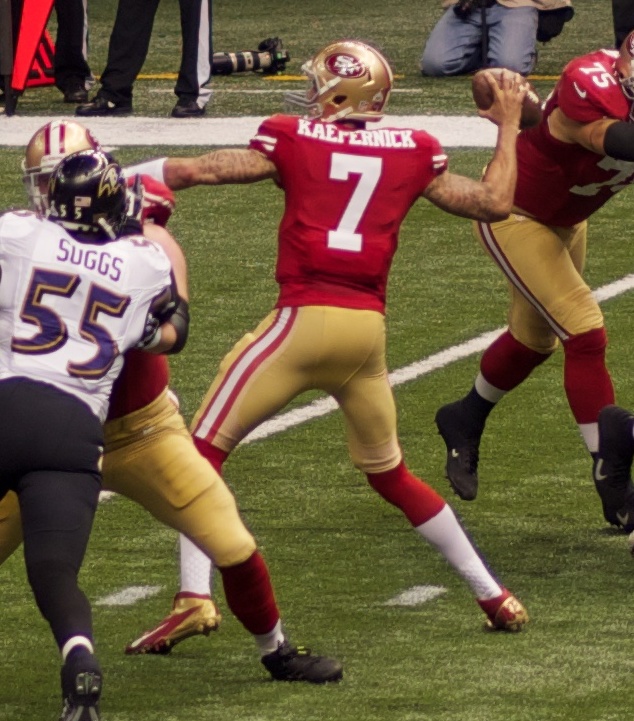
Wikimedia
On Nov. 13, GQ magazine announced Colin Kaepernick, an NFL player who became the face of the recent protest movement during the national anthem, as Citizen of the Year. Criticism poured in for this choice because some view him as unpatriotic. His critics claim he did little to no real action, and in actuality, encouraged unsuitable and ill-judged behavior.
Kaepernick was courageous enough to take one of the first steps in rejecting the recent acts of police brutality against African Americans. GQ magazine wrote in the feature, “he’s been vilified by millions and locked out of the NFL – all because he took a knee to protest police brutality.”
He inspired other athletes and teams to follow his lead and show their support for the Black Lives Matter movement. He became a symbol of resistance against those too afraid to speak out against the horrible actions of the systemic oppression against blacks in the legal system. The magazine even placed him next to athletes like Muhammad Ali and Jackie Robinson.
Kaepernick is worthy of the title for the activism and inspiration he instills in others. Even if no apparent change can be observed, he forces the media to discuss and recognize the issue he protests. He uses his position to fight a significant problem.
Not only are the people now recognizing the problem, but other athletes, especially NFL players, are aware of the power they have. Millions of Americans watch football every weekend, and these players have the ability to do more than just play the game. They can fight for an issue they believe in and spark some kind of change.
Kaepernick also pledged to donate $1 million to organizations that work in oppressed communities, specifically those that target the problems of racial inequality.
The question of whether or not Kaepernick deserves the award is more than just the focus of an individual. It addresses the bigger controversy of the right to protest during the national anthem. More than that, it demonstrates the fact that some see the issue of black oppression as an imaginary problem.
When a whole group of people believe that the United States is not living up to its values, they have the right to refuse to stand up for the national anthem. Kaepernick said “I’m not going to stand up to show pride in a flag for a country that oppresses black people and people of color.” The national anthem is an act of patriotism, but how are African Americans supposed to be proud and patriotic for their country when they constantly face maltreatment and abuse based off the color of their skin.
Kaepernick and other protesters are using their constitutional First Amendment rights to make a statement. Just because it is for an issue that not everyone agrees with, does not mean their actions are illegitimate and wrong. Some claim that it is disrespectful to those serving and who have served in the military, but a letter signed by a handful of veterans stated that there was no better way to honor the troops than by exercising individual rights.
America’s military fights for and defends the ability to freely exercise the rights America was founded upon. One of these rights is the freedom to peacefully protest.
Kaepernick became a symbol for the problem of black oppression in American society and is brave enough to sacrifice his athletic image for the betterment of a large group of Americans. He validates the Black Lives Matter movement and allows those suffering to feel like they are not alone. GQ magazine’s decision for Kaepernick to be chosen as Citizen of the Year will bring further awareness to the issues he stands for, and continue to enact positive changes to our society.
